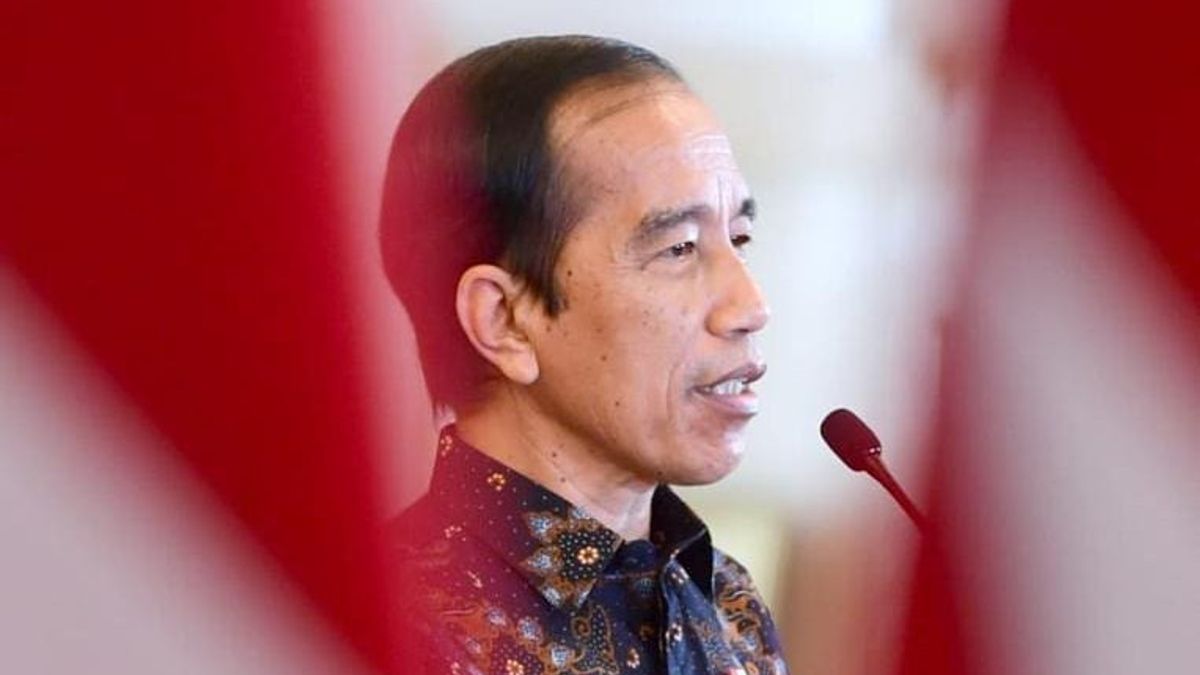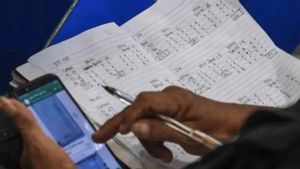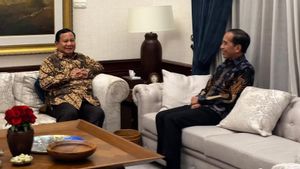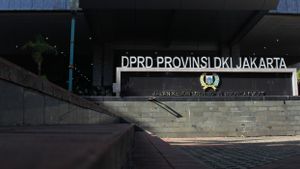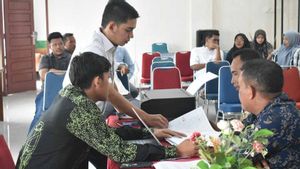JAKARTA - Many things have followed the criticism of 'The King of Lip Service' launched by BEM UI to Jokowi. Finally, Jokowi responded, saying he was open to criticism. But that's it. Another 'lip service' from Jokowi. There are many concrete proofs that Jokowi can do in response to this criticism.
We need to keep our eyes on the substance to see that President Joko Widodo (Jokowi)'s response has not touched the content of BEM UI's criticism. In uploading memes and visual illustrations of the University of Indonesia Student Executive Board (BEM UI), there are at least four points of criticism.
The first is Jokowi's statement that he once said he missed being demoed. Jokowi said, a government needs to be criticized, including through demonstrations. Jokowi said that when he was still the mayor of Solo. So what happens when the demonstration is done?
BEM UI alluded to various repressive actions carried out by state apparatus under the Jokowi administration against the masses in many rallies. Or about the revision of the ITE Law which is feared to be a tool of repression. Jokowi has also been criticized for his response to efforts to weaken the KPK.
[FLAVOR JOURNALISM: We Go to the Endgame KPK Nobar Location and Prove Sabotage Can't Roll an Already Developed Screen]
Jokowi has often expressed support for the KPK, while at the same time legitimizing the revision of the KPK Law, which weakens the agenda for eradicating corruption. In addition, the matter of how Jokowi asked for disagreements on the Omnibus Law on Job Creation was brought to the Constitutional Court (MK).
At another time, Jokowi also asked the Constitutional Court to reject all claims related to the Omnibus Law of the Job Creation Law. These are the basics that underlie Jokowi's nickname as 'The King of Lip Service'. Too many of Jokowi's statements contradict his own actions.

BEM UI also includes a list of bibliography and references that support their criticism, including the MEMORI article entitled History of the ITE Law: Megawati Submits Draft, Ratified by SBY and Continues until Jokowi.
"Everything indicates that (Jokowi)'s words were nothing more than lip service," wrote BEM UI in a statement.
"Jokowi often sells out his sweet promises. But the reality is often not in harmony. He says this, the facts are like that. Starting from longing for demonstrations, revising the ITE Law, strengthening the KPK, and a series of other promises."
Respond to 'lip service' criticism with lip serviceFreedom of Opinion AllianceBEM UI, BEM FISIP UI, BEM FH UI, BEM IKM FK UI, BEM FKG UI, BEM FIK UI, BEM FF UI, BEM IM FKM UI, BEM FIA UI, BEM FEB UI, BEM FMIPA UI, BEM FT UI , BEM FPsi UI, BEM Fasilkom UI, and BEM Vocational UI.#ITE#UUITE#All Can Be Affected#RevisiUUITENow Also pic.twitter.com/watZ5HUwJ1
— BEM UI (@BEMUI_Official) June 28, 2021
Then did Jokowi's response touch the four points of criticism? In a video uploaded to the Presidential Secretariat's YouTube channel, Jokowi admits that he understands that criticism is a form of student expression. Jokowi also reminded about the culture of manners and manners in the video.
"I think this is a form of student expression. And this is a democratic country. So criticism is okay. And universities don't need to prevent students from expressing themselves. But also remember that we have a culture of etiquette, a culture of courtesy."
In the video, Jokowi also reviews a number of criticisms he has received. "In the past, there were those who said I was a klemar-klemer. Some said I was a plonga-plongo," said Jokowi.
"Then again, there were those who said I was authoritarian. Then there were also those who said I was a lame duck and recently someone said that I was Mr. Bipang. And finally, someone said about The King of Lip Service," he added.
So much Jokowi remembers. Unfortunately, nothing in his sentence, Jokowi mentions the repression of the apparatus, the weakening of the KPK, the chaos of the Omnibus Law, the Job Creation Law or the ITE Law.
What should Jokowi do?The public needs concrete action. Jokowi's statement about himself being open to criticism means little. Researcher Associate Institute Criminal for Justice Reform Iftitahsari details what concrete things Jokowi can do.
First, everything related to freedom of opinion and expression. Jokowi is obliged to reject the articles that can threaten the freedom above. For example, starting with those closest to him, namely revoking the article on insulting the president which is still listed in the RKUHP.
"Then on another issue regarding the rubber article of the ITE Law, yesterday the President also promised to revise the law. But it turns out that what he has done is only limited to issuing ministerial decrees. Maybe it is necessary to be reminded of those commitments," Iftitahsari told VOI Thursday, July 1st.
Amnesty International Indonesia said the same thing. The summons by the rectorate and the hacking experienced by a number of BEM UI members were in the spotlight. These two things indicate that the freedom of expression and opinion has not been realized in the midst of state life in the country.
"Critical responses like this should be supported, not asked to be removed by universities or retaliated like hacking," said Amnesty International Indonesia Executive Director Usman Hamid, quoted by VOI.

"The alleged hacking experienced by several student activists and administrators of BEM UI is also part of silencing critics who can violate the right to freedom of expression and opinion," added Usman Hamid.
Usman Hamid detailed the amount of work that Jokowi had to do to keep his promises and words. Throughout 2020, Amnesty recorded at least 66 cases of digital attacks that violated the right to freedom of expression with a total of 86 victims.
The hacking victims consisted of 30 activists and 19 academics. Meanwhile, in 2021 there will be at least 44 cases of hacking social media accounts and video conferences against individuals or organizations who are also considered critical of state policies.
Amnesty reminded that the right to freedom of opinion and convey information is guaranteed and protected in various legal instruments. Internationally, this right is guaranteed by article 19 of the International Covenant on Civil and Political Rights (ICCPR), which is further explained in General Comment No. 34 to article 19 of the ICCPR.
This right is also guaranteed in the Indonesian Constitution. There are several provisions that provide space for freedom of opinion and convey information: Article 28E paragraph (3) and 28F of the Constitution, as well as Article 23 paragraph (2) and Article 14 of Law no. 39 of 1999 concerning Human Rights.
"If President Jokowi does not want to be branded as the 'King of Lip Service' then he must show his words with a real commitment in the form of policies that protect and guarantee freedom of expression and opinion," said Usman.
We have attempted to contact Presidential Spokesman Fadjroel Rachman to respond to this. However, until Thursday afternoon, at 13.10 WIB, our messages were not answered. Phone calls are also not answered.
*Read other information about JOKOWI or other interesting articles from Yudhistira Mahabharata.
Other BERNASThe English, Chinese, Japanese, Arabic, and French versions are automatically generated by the AI. So there may still be inaccuracies in translating, please always see Indonesian as our main language. (system supported by DigitalSiber.id)
